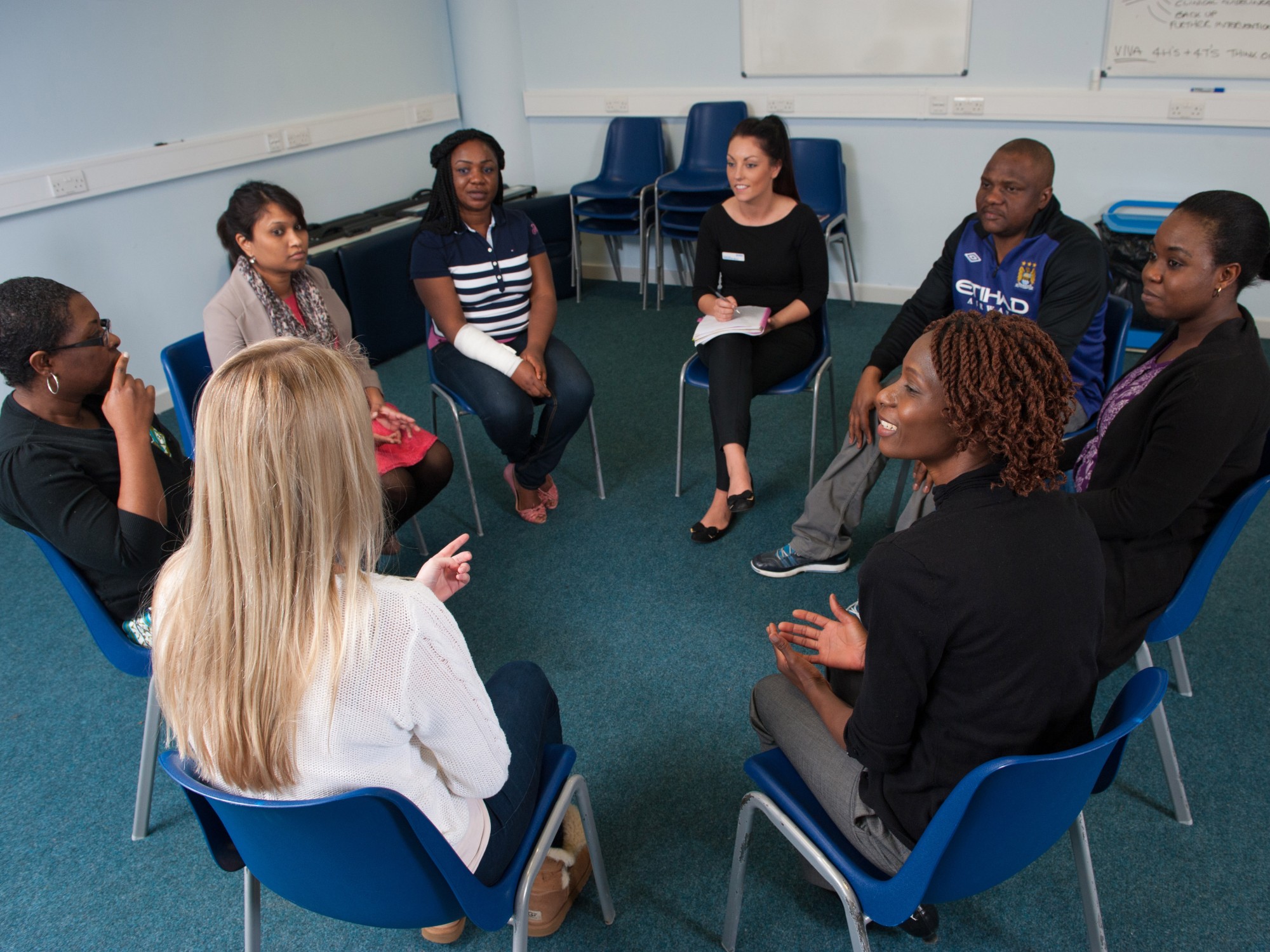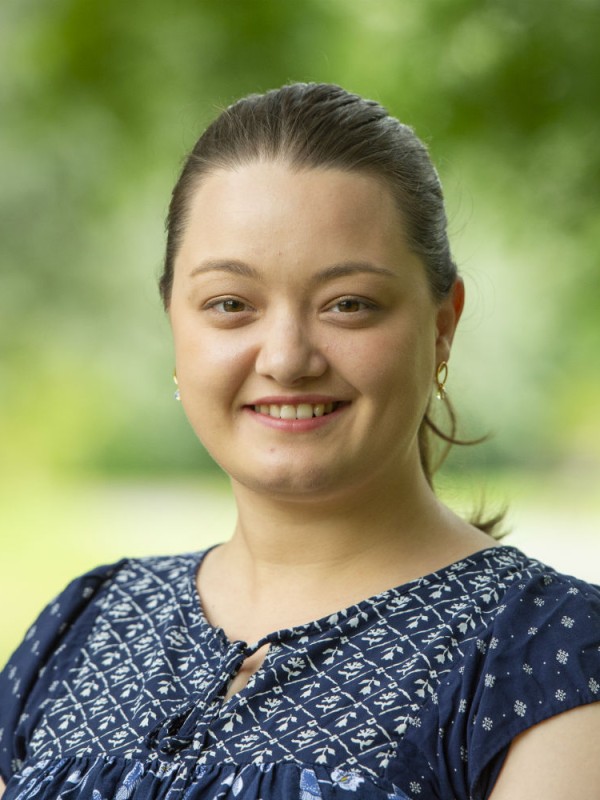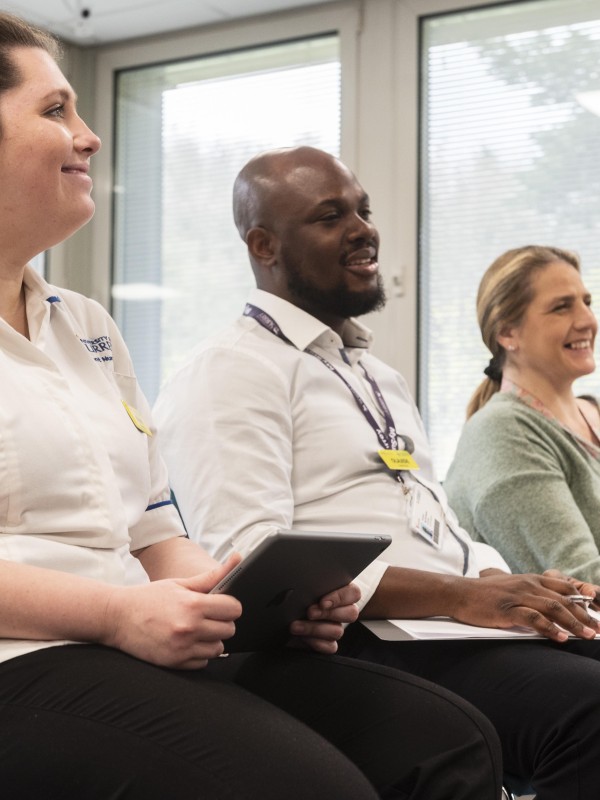
- Healthcare Practice
MSc — 2026 entry Healthcare Practice
On our Healthcare Practice MSc, you’ll benefit from an individual learning programme tailored to your area of clinical expertise. Our curriculum is designed to nurture your knowledge, aptitude and skills to advance your career in healthcare.
4,138+ people have created a bespoke digital prospectus
Why choose
this course?
- Spend some of your training in clinical practice to hone your skills in healthcare settings, under the supervision of qualified practitioners.
- Access our Clinical Simulation Centre, including our Immersive Learning Environment and Critical Care Unit, to practise real scenarios with actors and lifelike manikins.
- Learn from a multidisciplinary team of lecturers, many of whom are healthcare professionals with experience of working in the NHS.
Statistics
92%
Of our postgraduate health sciences graduates are in employment or further study within 15 months of graduating (Graduate Outcomes Survey 2025, HESA).
What you will study
On our Healthcare Practice MSc course, you’ll develop a critical approach to your studies and practice that will enable you to provide high-quality healthcare. You’ll have the opportunity to analyse key leadership issues in health and social care, while challenging and debating contemporary theory and practice.
You’ll explore advanced conceptual models, theories and frameworks of healthcare delivery, and you’ll learn how to evaluate healthcare strategies. You’ll study topics including decision-making, reflection, leadership and research methods.
You’ll also complete a research dissertation on an area of personal interest, which we’ll match with the expertise of our academic staff, ensuring you get the best support.
Clinical practice
On our practice-focused modules, you’ll develop your knowledge and skills within the health and social care setting that you currently work in, under the supervision of qualified practitioners.
Your UK healthcare workplace will need to provide you with a practice assessor and supervisor. They’ll simultaneously support and evaluate your practice abilities throughout the course.
Research groups
You will be able to join one of our research groups, where you’ll participate in discussions about research topics, findings and publications, and you’ll benefit from our links with renowned research institutions across the world. We also have a host of external speakers that visit us and present their work, and a collection of seminars and workshops, allowing you to network with like-minded individuals.
Facilities
You’ll benefit from our multimillion-pound facilities, home to our Clinical Simulation Centre that includes two wards, a critical care unit, a community flat and an immersive learning environment. With the help of actors and lifelike manikins, you can practise your skills in realistic and safe settings.
This part-time course provides flexibility to complete modules, taking between 2-5 years to complete (dependent on how many modules you select to study at any given time), allowing you to fit your study around existing commitments.
The structure of our programmes follows clear educational aims that are tailored to each programme. These are all outlined in the programme specifications which include further details such as the learning outcomes:
Modules
Modules listed are indicative, reflecting the information available at the time of publication. Modules are subject to teaching availability, student demand and/or class size caps.
The University operates a credit framework for all taught programmes based on a 15-credit tariff, meaning all modules are comprised of multiples of 15 credits.
Course options
Unstructured years
Semester 1
Core
This module is designed to meet the needs of professionals working in health and social care who are interested in introducing change within their practice environment. The module will explore the current healthcare agenda, examining the need for change to meet the contemporaneous needs of the population. Students are encouraged to reflect upon how innovative practice could transform service delivery to improve experience quality, relative to their own area of practice.
View full module detailsThe focus of this module is unusually on you as an individual. We examine where you currently feel you are in the context of your professional, personal, and academic journey. As professionals working within health and social care environments, much of our daily focus is on others, this module provides students with an opportunity to pause, to reflect, assess and evaluate what you need to develop within your career. This is a great first module for students returning to study, or for anyone wanting to refocus, as the journey of discovery leads to deep learning and enhanced confidence in your professional, personal and academic needs, so provides a direction for future development.
View full module detailsThis module empowers health and social care professionals to examine the factors contributing to workplace safety and the care of patients/service users, considering the influence of human factors on safety. Additionally, the module encourages students to critically assess the interplay between national patient safety policies and their impact on local guidelines and policies. Moreover, students will cultivate a critical understanding of the intricate legal and ethical issues affecting patient safety. They will also scrutinise the role of accountability in effectively managing safety and risk in the workplace.
View full module detailsSemester 2
Core
This module provides students with a fundamental understanding of the core principles of engaging, supporting and leading people. Students will be empowered to support or create workplaces where staff thrive and collaborate, enabling patients and users of health and social care services to feel safe and supported. Exploring the concepts of care, compassion, courage, and vulnerability, to develop skills in enhancing relationships and creating safe environments.
View full module detailsSemester 1 & 2
Core
The module enables students to understand the theoretical and practical aspects of research; how to design research informed by theoretical, methodological and practical issues; and how to prepare a research proposal relevant to health and social care practice. The module provides students with the knowledge, skills and confidence in planning and writing a research proposal that can be taken forward to the dissertation module.
View full module detailsThis module will explore the role of decision making within the healthcare environment. It will support students' exploration of their understanding and knowledge of the theory underpinning decision making, judgement and human factors within healthcare, and the potential influential factors including; policy, risk, finances, ethics, the environment, shared decision-making, and the actual and potential consequences of the decision.
View full module detailsThe module will develop public health nurses knowledge and skills in reviewing and critically analysing research, data and public health policy relating to an area of public health need in their local workplace community. Students will develop and plan an innovative public health project to address a community health need. This module typically focuses on the practical aspects of project development within the context of public health nursing.
View full module detailsAcross academic years
Core
The dissertation module supports students to plan, undertake and report on a substantial original project that is relevant to their professional practice and their workplace organisations. Students will choose a topic area of their interest and will be supported throughout the project by a named supervisor. The project will involve developing a relevant research question and outlining the relevant policy context, carrying out a literature review, developing a robust methodology, collecting/identifying and analysing/synthesizing data, and to critically discuss the relevance of the findings to practice and current knowledge. Students will gain confidence in understanding and applying the research process. The students will have the opportunity to develop skills in research leadership, critical thinking, and writing, translating knowledge into practice, literature reviewing and digital knowledge.
View full module detailsOptional modules for Unstructured (3-5 years) - FHEQ Level 7
For further information regarding programme structure and module selection, please refer to the course catalogue.
Teaching and learning
You’ll learn from a multidisciplinary team of lecturers, including healthcare professionals and researchers, which may include adult nurses, children's nurses and paramedics. You’ll also be taught by guest lecturers, made up of local doctors, nurses, midwives and other healthcare workers.
There may be occasions when the delivery of your teaching is supported by graduate teaching assistants. The University has a set of procedures that govern the use of postgraduate research students in this way.
Learning methods
- Group work
- Independent study
- Lectures
- Online learning
- Role play
- Seminars
- Simulation learning
- Tutorials
Assessment
We use a variety of methods to assess you, including case studies, examinations, presentations, simulated learning experiences (objective structured clinical examinations – OSCEs) and written work. When you’re in clinical practice, your knowledge, skills and professional behaviour will be assessed by your practice assessor and practice supervisor.
Check individual module information to see full details at a module level.
General course information
Contact hours
Contact hours can vary across our modules. Full details of the contact hours for each module are available from the University of Surrey's module catalogue. See the modules section for more information.
Timetable
Students will receive a timetable at the beginning of each module. If you have not applied for any modules, please contact the programme leader who will arrange a tutorial with you.
Scheduled teaching can take place on any day of the week (Monday – Friday), with part-time classes normally scheduled for one or two days.
Location
Our medicine, paramedic science, nursing and midwifery, and CPD health sciences courses are taught at the Kate Granger Building (30 Priestley Road) on the Surrey Research Park.
For some modules, elements of assessments will be completed at your practice location.
We offer careers information, advice and guidance to all students whilst studying with us, which is extended to our alumni for three years after leaving the University.
Our course allows you to broaden your education, focus on your specialist area of practice and meet the educational needs of your employer or prospective employer. We’ll help you stay competitive in the job market as a healthcare professional, developing your practice abilities and expanding your knowledge, so you can compete with recent graduates.
92% of our postgraduate health sciences graduates are in employment or further study (Graduate Outcomes survey 2025, HESA). They work for the NHS, private healthcare organisations and academic institutions.
Visit the NHS careers website for further information on healthcare roles.
Please note, this course doesn’t give access to registration with the UK Nursing and Midwifery Council (NMC) and the Health and Care Professions Council (HCPC).
UK qualifications
A minimum of a 2:2 in a relevant UK honours degree, or a recognised equivalent international qualification.
You must be currently registered as a healthcare professional to apply, students are required to be registered on the appropriate part of the NMC or HCPC register.
For information on entry requirements based on International Qualifications, please contact the admissions team with details about where you studied and the content of your qualification.
English language requirements
IELTS Academic: 7.0 overall with 7 in each element.
These are the English language qualifications and levels that we can accept.
If you do not currently meet the level required for your programme, we offer intensive pre-sessional English language courses, designed to take you to the level of English ability and skill required for your studies here.
Selection process
Applications will be reviewed on an individual basis and potential students will be offered advice by an academic tutor on the suitability of the award and their module choice within the award. This is dependent on factors such as currency of prior learning, and their personal and professional development needs.
Students should be able to show potential benefits from studying for the award and a commitment to attempting the assessment items. If students have not studied on an academic course within the last five years, they may be asked to carry out an academic piece of writing as part of the selection process.
International students travelling to the UK
Due to the module structure of this programme, we are unable to provide sponsorship on the Student Route. International students should make use of the Visitor Visa Route to attend the practical component of the programme. Further details can be found on our apply for a visa page.
Unfortunately, the University cannot guarantee that Visitor Visa applications will be successful, and a refusal may result in students being unable to successfully complete the programme.
Scholarships and bursaries
Discover what scholarships and bursaries are available to support your studies.
Fees
The majority of students on this course will be funded through sponsorship arrangements with their NHS trust employer.
If you would be self-funding, please contact cpdinvoicing@surrey.ac.uk for information regarding the fees.
This course is self-paced, so students will pay fees on a module-by-module basis, please see our modules for further information.
Additional costs
- Travelling expenses such as those incurred for travelling between their clinical practice area and the University.
- General programme related costs such as study materials.
- Potential costs involved in working/studying remotely e.g. internet connection etc.
Apply online
To apply online first select the course you'd like to apply for then log in.
Select your course
Choose the course option you wish to apply for.
Sign in
Create an account and sign into our application portal.
Please note that we may have to close applications before the stated deadline if we receive a high volume of suitable applications. We advise you to submit your application as soon as it is ready.
ApplyAdmissions information
Once you apply, you can expect to hear back from us within 14 days. This might be with a decision on your application or with a request for further information.
Our code of practice for postgraduate taught admissions explains how the Admissions team considers applications and admits students. Read our postgraduate applicant guidance for more information on applying.
About the University of Surrey
Need more information?
Contact our Admissions team or talk to a current University of Surrey student online.
Terms and conditions
When you accept an offer to study at the University of Surrey, you are agreeing to follow our policies and procedures, student regulations, and terms and conditions.
We provide these terms and conditions at offer stage and are shown again at registration. You will be asked to accept these terms and conditions when you accept the offer made to you.
View our generic registration terms and conditions (PDF) for the 2025/26 academic year, as a guide on what to expect.
Disclaimer
This online prospectus has been published in advance of the academic year to which it applies.
Whilst we have done everything possible to ensure this information is accurate, some changes may happen between publishing and the start of the course.
It is important to check this website for any updates before you apply for a course with us. Read our full disclaimer.










